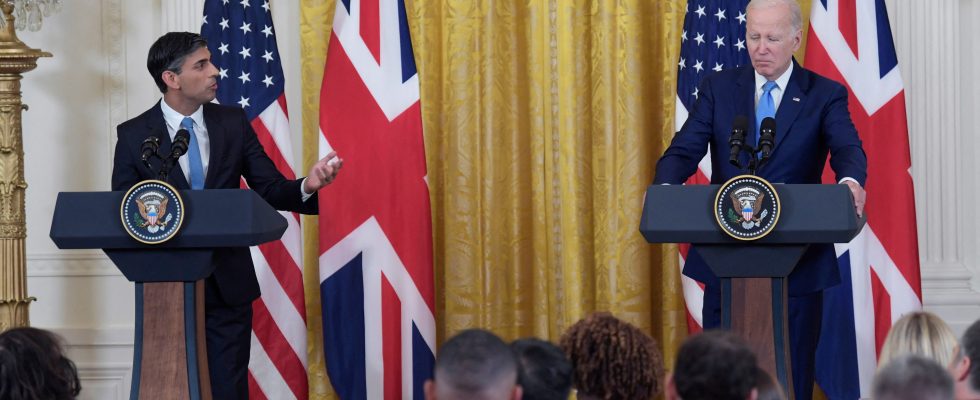London and Washington want to relaunch their privileged relationship. To rekindle the flame, nothing better than a declaration of friendship. British Prime Minister Rishi Sunak and US President Joe Biden announced a new economic partnership in Washington on Thursday, June 8, under the name of “Atlantic Declaration”. “We can count on each other with absolute confidence”, said the British Prime Minister during a joint press conference while the second assured that America had “no closest ally ” than the UK.
An “Atlantic declaration” presented Friday by the two leaders provides for enhanced cooperation in the defense industry, in civil nuclear power and in the supply of metals essential to the energy transition. On this last point, Rishi Sunak obtained from the White House that British industrialists benefit in part from Joe Biden’s gigantic subsidy plan, the “Inflation Reduction Act” (IRA), which promotes without complex the “made in America” . In other words, the British will be eligible for US government contracts. Also, an element of the declaration relating to minerals needed for battery technology will allow UK electric car makers to benefit from part of the IRA grant scheme.
In terms of defence, the American president has promised to open access to the American market to British industrialists in order to boost the development of hypersonic missiles in particular. The agreement between the two countries, tailored to deal with China and Russia, also covers energy security and the reliability of supply chains. It bears the mark of the “new Washington consensus”, that is to say the economic doctrine of the Biden administration, for which industrial and trade policy must be dictated by considerations of security and sovereignty, breaking with the dogma of free trade.
“A series of economic mini-agreements”
“China and Russia are ready to manipulate, exploit or steal our intellectual property, use technology for authoritarian purposes or deprive us of vital resources such as energy. They will not succeed,” Rishi promised. Sunak. Joe Biden for his part criticized the major Chinese international investment program, the “New Silk Roads”, calling it a “debt and confiscation program”, which “does not go very far”. A data protection agreement aims to reduce difficulties for small businesses trading between the UK and the US. Number 10 said it could save over £90m a year. The two countries will also collaborate on key industries such as 5G and 6G telecommunications, quantum computing, semiconductors and engineering biology.
The British daily The Guardian stresses that this “historic deal puts the UK firmly in the economic orbit of the US, but falls far short of the comprehensive trade deal promised by the Conservatives in 2019”. Questioned by the political editor of the BBC, Chris Mason, while the new deal was an “acknowledgment of the failure” to secure a broader UK-US trade deal, Rishi Sunak said today’s deal “responds to the particular challenges and opportunities we face at this time”. For his part, the Guardian sees it more as a “series of economic mini-deals”, even if they mark a renewal of ties after the turmoil of Brexit.
Indeed, the symbolism of this initiative is important. The relationship between the two countries is much more fluid today than in the days of Boris Johnson and Liz Truss, to hear the exchanges of pleasantries between the two men at the White House. The Prime Minister even considered that it was necessary to speak of “indispensable alliance” rather than “special relationship”, the term generally used to describe the link between London and Washington. In the absence of a free trade agreement, Rishi Sunak leaves Washington with some support from the United States for his ambitions to regulate artificial intelligence: “We are counting on (the United Kingdom) to lead the efforts” in in favor of regulation at an upcoming summit in the fall, said Joe Biden, stressing that artificial intelligence “has the potential to cause significant damage if left unchecked”.
Ukraine at the heart of cooperation between Washington and London
However, Labour’s shadow secretary of state for foreign affairs, David Lammy, criticized Rishi Sunak, saying the government had left “British cupboards bare” by failing to strike a trade deal. Days earlier, David Lammy slammed Rishi Sunak on his foreign policy saying he was showing a “little England mentality” in foreign relations, warning the UK risks marginalizing itself in global debates.
In addition, the American president was more cautious about another London project, namely to place the British Minister of Defense Ben Wallace at the head of NATO. “Perhaps” a Briton could take the helm of the Atlantic Alliance, considered Joe Biden, as the term of the current secretary general, Jens Stoltenberg, ends in October. He felt that Ben Wallace was “very qualified” but stressed that “a consensus” would have to be found within NATO.
Joe Biden and Rishi Sunak had already seen each other several times, on the sidelines of international summits or to launch a major military collaboration with Australia, but this reception in Washington is by far their most formal interview. Their discussion unsurprisingly also revolved around Ukraine. The United States has repeatedly touted Britain’s commitment to supporting the Russian invasion. “Together, we are providing economic and humanitarian aid and security systems to Ukraine in its fight against a brutal invasion from Russia,” said Joe Biden. In this regard, the American president, pilot of Western support for Kiev, assured that he would have the “necessary funds” to support Ukraine in its war against the Russian invader “as long as it takes (it) “, despite the doubts expressed by some Republican parliamentarians.
